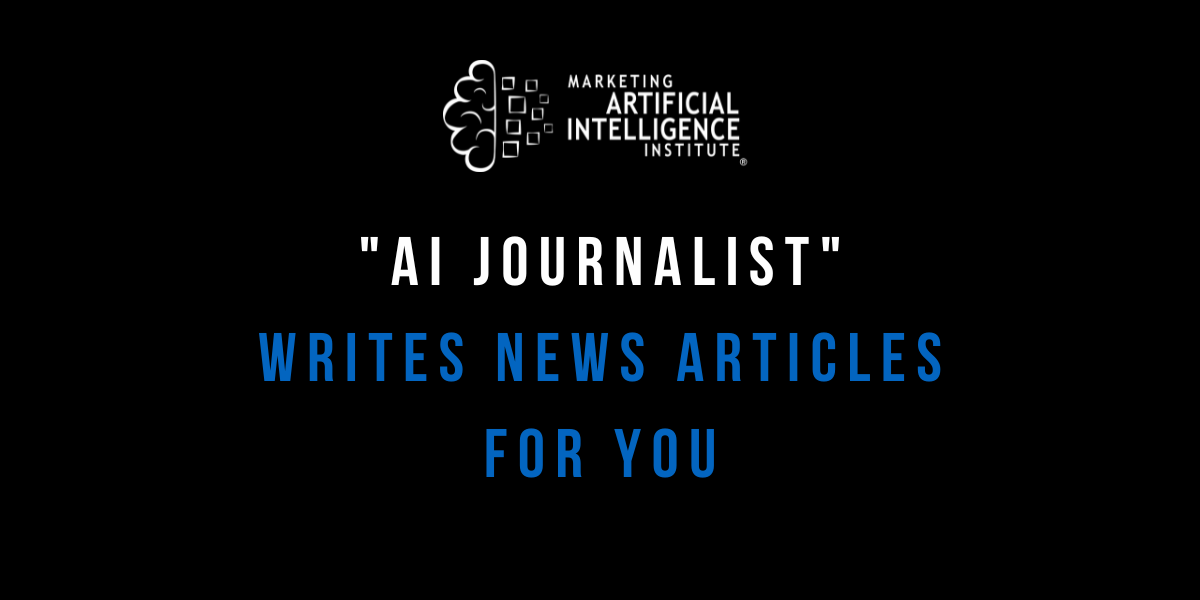A new tool called AI Journalist is exactly what it sounds like: AI that writes news articles for you.
AI Journalist comes from AI company HyperWrite. And it generates articles on any topic you give it.
It does that by:
- Searching the internet for articles and real-time details.
- Picking the best sources and reading them.
- And then writing an in-depth article based on what it finds.
Importantly, it also hyperlinks all its sources right within the article.
This is an early-stage tool, but our initial experiments with it were impressive:
Within seconds, it generated a solid long-form article on a current topic with sources.
How is AI Journalist going to change human journalism?
I got the full scoop from Marketing AI Institute founder/CEO Paul Roetzer on Episode 90 of The Artificial Intelligence Show.
Copyright is a huge, immediate concern
Current copyright laws, at least in the U.S., mean that a tool like this isn't replacing journalists anytime soon.
“If you’re a media outlet, it doesn’t change the fact that U.S. copyright law mandates that a human has to create something to get a copyright," says Roetzer.
"And I don’t know of a publishing outlet that wouldn’t want copyright on their material, so I don’t see this as all of a sudden journalists are just going to start using this stuff.”
Not to mention, this isn’t journalism
We love the tool. And it has a clever name. But it’s important to remember that great journalism is sourced.
You go talk to people. You do interviews. This tool is pulling from third-party existing sources. It’s not replacing the type of journalism that breaks original news.
But it IS a huge win for internal research
The tool has massive potential when it comes to research.
Myself and Paul were on a call talking about a topic. We had a question about details related to the topic that required additional research. So we had AI Journalist do it while we were on the call.
In seconds, we had a long-form article on the topic, with solid sources for us to explore further.
“We have to verify the facts, but it literally just saved us an hour of doing research and writing a brief, which is something we do all the time," says Roetzer.
Not to mention, we don’t need copyright on these internal research briefs.
This use case alone is a huge win for our company.
And tools like this could actually save local journalism
As a journalist, you could still use a tool like this. Just not to do your entire job.
For instance, you could have it generate the start of a story. Then, layer in the interviews, original research, and reporting that make great stories.
This could be potentially valuable for local journalism, says Roetzer.
“For years, we’ve been watching that industry get crushed and it had nothing to do with AI,” he says. Their reliance on advertising wiped out their business model when the internet disrupted the ad space.
But society still needs local news. We want to be informed about what’s happening immediately around us.
“And because the business model doesn’t support that happening anymore, we have communities that have no viable news coming in,” says Roetzer.
He sees one potential future where AI augments a handful of skilled editors to write local news stories, making it possible to provide accurate news to all the communities that need it.
“I can actually imagine a scenario where local media re-emerges in an entirely different, more streamlined model, and may actually create new writing and editing jobs where the AI and the human are working in tandem,” he says.
“I don’t want to pretend there aren’t negatives here. But I think that if you step back, there’s a chance to re-imagine the whole industry.”
Mike Kaput
As Chief Content Officer, Mike Kaput uses content marketing, marketing strategy, and marketing technology to grow and scale traffic, leads, and revenue for Marketing AI Institute. Mike is the co-author of Marketing Artificial Intelligence: AI, Marketing and the Future of Business (Matt Holt Books, 2022). See Mike's full bio.



